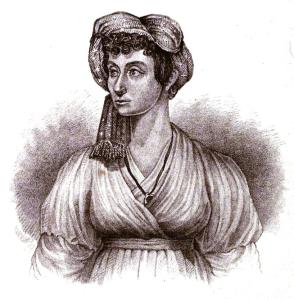One popular book on the Regency bookshelf was written by an unlikely spinster, Catherine Hutton (1756-1846). She used the character of a spendthrift to conquer a miser in her 1813 novel The Miser Married, A Novel. The story is mostly a series of letters, many consisting of a daughter’s observations of her widowed mother’s adventures and those of the widower Mama sets her cap for.
The novel opens with Mr. Winterdale, a gentleman of some means who keeps to himself and known to be ever careful of his money. He is quite aware of his new neighbors:
“The lady who has taken Ravenhill Lodge is come to it, with her family, which Martha tells me consists of a daughter and a niece. She says Mrs. Mereval is a handsome woman, not more than eight and thirty, and that the two girls are very beautiful. So they may be for me. I had a glance of two female figures, peeping through the lattice of the little door in the park wall, and I sent for the carpenter directly, to nail it up with boards. These women may, perhaps, think they have a right to be acquainted with me, because they chuse to come and live at the next house. I can tell them that will be no easy matter.”
Then we have the daughter’s letter, written in the wake of being diverted from reading her novels:
“Which, my dear Harriet, in the catalogue of human events, do you think capable of bringing Mr. Winterdale to our house? ..not for a morning call but a positive inmate; eating, drinking and sleeping under our roof? You are mute with astonishment; at length you answer, “a broken leg, perhaps.” Your conjecture is exactly right.”
Throughout the three volumes of the novel, the series of letters from the characters cleverly display a wide range of personalities in a diverting tale of the miser and the beautiful widow. The author is not above commenting on other Regency books, relying on the aforesaid novel-reading daughter:
Mrs. Hannah More–Cœlebs in Search of a Wife. Comprehending observations on domestic habits : “Wicked novel reader as I am, I confess that, in some of her long arguments, I turned over six leaves, instead of one!”
On Maria Edgeworth’s Lenora: “The moral purpose of Leonora is to persuade woman to attend to her duties, rather than her rights. In a word, to counteract Mary Wollstonecroft.”
Of Holcroft and his Anna St. Ives: “(It) is written, as the author, himself, declares, to inculcate the lesson of fortitude to females. I admire her fortitude; but I think her rather too philosophical, for a young lady.”
Miss Hutton was an expert on characterization, a talent highly prized by Regency readers. As such, she was certainly aware of how her keen observations might strike a nerve in more than one quarter. In her Prologue, she lays bare her trepidation in releasing her first novel to the “awful Tribunal of the Public.”
She knows she is an unlikely novel-writer, being only certain of her ability to make a variety of puddings:
“..but that I possessed the inherent qualities necessary to write a book, was not suspected by me, till lately.”



It drives me nuts to see that books in the public domain are listed on Google books as not for reading because some publisher has decided to print them. That doesn’t give the publisher a copyright because they had nothing to do with the creation. Did you find all the volumes at another source?
I have to agree about Colebs and Leonora.
Coelebs (a bachelor) searches for a perfect wife much like Richardson’s Grandison. Jane Austen liked Richaradson but wasn’t quite as enthusiastic about More.
Leonora is the story of a wife whise husband is led astray by a fem-fatale. He is bewitched by her and is on the brink of running off with her to Russia even though his wife is having his child
The man is disillusioned by his lady love before he is too far away to return . he ses his innocent wife with a babe at her breast and swears to be faithful to her forever. He also says that if she had ever harangued him, or criticized him for his adultery that he would not have returned. A wife was to be sweetly oblivious and silent about any poain the husband causes her by his notorious chasing after another woman. It was believed that only a true scoundrel would not be reformed by the sight of an innocent babe at the breast of an innocent wofe. Lady Byron beleived this and I think one of the reasons she separated from her husband was that he didn’t fall down and worship at the throne of the madonna.
LikeLike
I’m glad you came by, Nancy. Your expansion on the topic is invaluable.
LikeLike
I love this, Angelyn!! I have to read this book!! Shared and Tweeted.
LikeLike
Thanks so much, Ella!
LikeLike
Very interesting post! I need to read that book! If only I were capable of making a variety of puddings…
LikeLike
Puddings are quite tricky. Thanks for stopping by, Ally!
LikeLike